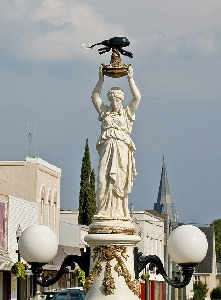
Contact: Rhett Barbaree, 205-280-1073
ENTERPRISE, Ala., Dec. 17, 2012 /Christian Newswire/ -- It was known as "the meanest little bug in America," and it laid waste to every cotton field from Texas to South Carolina, leaving economic ruin in it's wake. By the time the boll weevil reached southeast Alabama in 1915, millions of dollars had been lost to what many referred to as a plague of biblical proportion.
"You can only imagine how folks must have felt back then," stated Rhett Barbaree, author of a new inspirational novel titled Thank God for Boll Weevils. "The crop that greased the economic wheels of the South was being lost year by year and lives were being affected. People were losing their homes and land. It was a sad situation."
Two of the key people who developed solutions to the problem were H. M. Sessions, a crop speculator from Enterprise, and George Washington Carver, the agriculture professor and scientist at Tuskegee Institute, who would later become famous for developing more than 300 uses for the peanut. "There is no evidence that these two men even knew each other, much less that they shared ideas," Barbaree said. "Sessions was simply looking for another cash crop to replace cotton, and Carver had been trying for years to convince farmers to grow peanuts as part of their crop rotation -- a method now widely implemented to replace nitrogen in the soil. It was Sessions, however, who would have the peanuts grown on a larger scale and soon after the first crop of 8,000 bushels came in, a chain reaction of good fortune began. The man who owned the Enterprise Cotton Seed Oil Company offered contracts to all farmers in the area who would grow peanuts the following year. The participation for the idea was overwhelming, and Coffee County, Alabama, became the world's leading producer of peanuts for the next three years. At about this same time, Carver introduced six new uses for the peanut, solidifying the market and compelling others throughout the South to start growing the plant."
And while the book encompasses a vivid history of those events, the accolades for the novel come from the way it's told. "I wanted the reader to be able to place themselves there, identifying with the characters, the surroundings, and the history of what took place." the author said. And though the book entertains the reader with southern dialect and humorous antidotes Barbaree is quick to point out the serious side of the story. "What happened back then was definitely a God thing, a blessing in disguise and one the people of Enterprise wanted to remember." So it was in 1919 that a monument was erected to the insect by it's citizens in appreciation for the changes the boll weevil made in diversifying their approach to agricultural.
"If you think about it that monument really symbolizes something we all need to embrace." Barbaree said. "Each of us at one time or another suffer from tribulations and tragedy's during our lives and that monument on Main Street in Enterprise, Alabama is proof that if we can learn to lift up those kind of things to God He can take them and turn them into something good."
A synopsis of the novel can be found on amazon.com/shops/tiger-iron-press.

